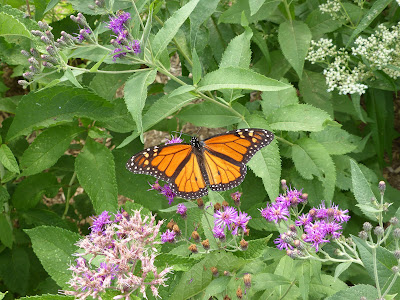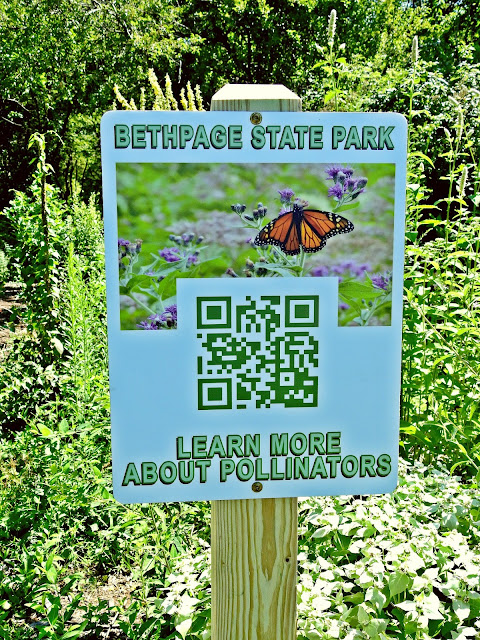Happy National Pollinator Week From Bethpage State Park
  |
Monarch butterfly and honey bee enjoying blooming, native plants in our picnic area pollinator garden. |
Did you know that this year, June 19-25th is National Pollinator Week? In fact, the U.S Department of Agriculture has announced this weeklong event every year since 2007 to promote greater protection for pollinators and build awareness for the ecosystem services they provide. The true definition of a pollinator is any organism who visits the same flower species, transferring pollen as they feed and assisting plant fertilization as a result. These animals include insects (such as bees, butterflies, moths, beetles etc.), birds and bats. The assistance that these species provide not only ensures the next generation of plants for parks and backyard gardens… the overall pollination process creates a healthy habitat for wildlife, clean air for us to breathe and crops to eat. However, in recent years, the number of pollinators and the plants they rely on have declined dramatically due to human intervention and negligence. Now more than ever, pollinators deserve our utmost attention and appreciation. With that in mind, we are proud to say that here at Bethpage State Park (BSP) our local pollinators are receiving just that, with our commitment to creating pollinator habitats and providing educational outreach. To specifically celebrate Pollinator Week, this Wednesday our park hosted an educational tour for a Nassau Community College (NCC) class. This event was set up by our park ecologist Yael Weiss, after discussing the outdoor learning opportunities BSP could offer NCC biology professor Kumkum Prabhakar and her summer ecology students. In addition to being an environmental educator, Professor Prabhakar is a skilled botanist who has studied milkweed morphology and the coevolution of plants and their pollinators. Having this event seemed like the perfect way for both parties to do their part in celebrating this national event.
The first stop on our tour was the picnic area pollinator garden. Students learned that this massive green space was built from scratch, as a result of the collective effort made by park employees, local volunteers and sponsors pushing pollinator conservation. It was here that our park horticulturist, Victor Azzaretto, was able to share his personal experiences and wisdom with regards to designing and managing this habitat. Students were also given educational resources to help identify pollinators and host plants within the garden. Another topic of conversation was the importance of creating a garden with native plant varieties (as differing shapes, colors and sizes of flowers are necessary to attract different pollinators throughout the season). The next stop on our tour was to view a somewhat different kind of habitat, an area far less managed but nonetheless protected as a refuge for pollinating insects at BSP: the milkweed patch on #4 of the Black Course. Here the class was able to see feeding butterflies in action while park staff discussed the critical role milkweed plays in the lifecycle of the monarch butterfly. Our last stop was the greenhouse grounds to learn more about BSP’s methods for seed collection and propagation. This part of the tour was to give students a behind-the-scenes understanding of how previous pollinator gardens and native areas on the courses can provide resources for future plantings. Overall, we believe this tour was a great educational opportunity, one that allowed us to network with the local community and share our park’s commitment to environmental stewardship. Please help us continue to celebrate pollinators this week by sharing this story on social media and visiting our blooming picnic area for yourselves, now and all throughout the summer!
  |
Park horticulturist Victor Azzaretto and ecologist Yael Weiss discusses the variety of
native host plants growing in the picnic area pollinator garden.
|
 |
Andrew Wilson, Director of
Agronomy, points out monarchs while also discussing the importance of
protecting milkweed patches in the rough areas on our golf courses.
|



Comments
Post a Comment